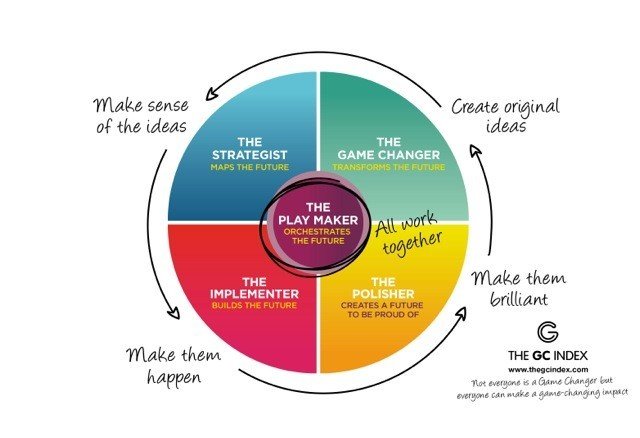Many traditional corporate organisations are struggling to adapt to the demands of a new world that is rapidly changing around them. They are clinging on to the same ideas, talent management models, and ways of working with leaders who are either oblivious to the current mindset or too frightened to instigate change. Research by the GC Index suggests that Game Changers, the very people with the potential to initiate and drive transformational change, are rarely able to make their mark in corporate settings.
Game-changing is different to innovation. Innovators build on what has been done before: the pursuit of excellence through continuous improvement and incremental change. It’s Game Changers who can help trigger and drive transformational change.
The reality is that many organisations are driving their vision through the need for innovation. They often deliver this in quite a controlled way, by investing in innovation hubs, labs, processes and programmes.
So here are six ways that organisations that create game changing teams and cultures
1) FOCUS ON CONTRIBUTION
We need to do more than focusing solely on past experience and who is ‘available’ to work on a project. Instead, we should focus on the real contribution that individuals can make – focus on who is ‘best’.
By understanding what each person can contribute to their team, project and to the wider organisation, leaders are far more likely to create a game-changing culture.
2) IDENTIFY YOUR GAME CHANGING TALENT
In a world where today’s employee can be tomorrow’s competitor, identifying and embracing Game Changers is critical to long-term business performance. The GC Index is a new organometric, which enables organisations to identify their Game Changers.
Companies are using The GC Index to better understand the profile of their organisation and teams. It helps them maximise the contribution individuals can make at all levels and to ensure they create game-changing teams.
3) HELP GAME CHANGERS TO DEVELOP CORPORATE SKILLS
Most Game Changers find it difficult to navigate their way around a traditional corporate organisation. As a result they are often seen as dysfunctional or slightly awkward.
It’s important to help Game Changers understand the contribution other people make, and how others can help realise their game-changing idea.
By helping them recognise that some people will find their game-changing nature unsettling at times, and by giving them the tools to influence other people, they are far more likely to be able to make a positive game-changing contribution.
4) CREATE A GAME CHANGER COHORT
The CG Index research suggests Game Changers appear to naturally group together – by doing so they are able to express themselves freely and often more likely to realise their potential. There are lots of examples of this, whether it is in Silicon Valley, artists in Paris, or Fintech hubs in global financial districts.
Giving Game Changers a space to work together can promote both knowledge transfer and retention, in addition to increasing commitment and engagement through valued interpersonal connections.
5) FOCUS ON CULTURE CHANGE – EDUCATE MANAGERS
A fifth priority for organisations is to acknowledge that without changing the attitudes of managers and leaders, the engrained culture will continue to undermine progress towards achieving a game-changing culture.
We need to educate managers so that they understand the importance of game-changing talent and how to manage Game Changers. We also need to get them to start shifting their mindsets and put contribution and impact at the heart of their talent decisions. This focus on contribution will break down any inherent ‘unconscious bias’ and move managers out of the ‘fail safe zone’ to one where firstly they themselves feel ‘safe to fail’.
6) FIND A GAME CHANGER CHAMPION
Creating a game-changing culture requires an element of risk and therefore it’s important to have a Game Changer champion at the top.
It really needs someone on the Board who understands Game Changers and what is required to ensure they deliver value. Ground breaking creativity and innovation may lie with one individual. But it’s only a game-changing team that can achieve step change innovation and transformation that has longevity.
If you want to discover more about what type of Game Changer you are then why no join us for the launch of The ChangeMaker Profile powered by the GC Index on Tuesday 27th February in London. You can secure your place here.
The ChangeMaker Profile powered by the GC Index is a focused solution for those in the world of change and change management, which was developed in response to world-wide client demand. It leverages its framework of impact and contribution to support individuals, teams and organisations, throughout the transformational change process and is often used by organisations and individuals alongside other change management tools to give them the foundation to kick-start their change journey.
The profile allows people to understand how they can play to their natural strengths and maximise their contribution to change as an individual and as part of a team.
Can’t make the event but want to learn more, simply drop me a line at Julia@businesshorsepower.com and we can have a conversation to explore how this solution could benefit your organisation.





